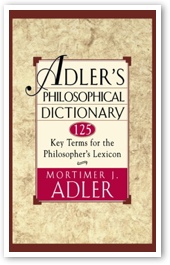Beauty
- MORTIMER J. ADLER
In everyday speech, when people use the noun "beauty" or the adjective "beautiful," they use it to mean something they think is fine or wonderful — almost a synonym for the word "swell."
 |
They do not think of the sense that these words have in philosophical aesthetics.
St. Thomas Aquinas' definition of beauty as that which pleases upon being seen tends to support subjectivism. For "being seen" read instead "being beheld," and then what Aquinas is saying is that which, when beheld, gives us pleasure, we call beautiful. Different persons get pleasure of this sort from different objects. They differ in their tastes. What one person finds enjoyable, another might behold with no pleasure at all.
However, there is another aspect of beauty that most persons fail to consider. In addition to the enjoyable, there is the admirable. What makes one object more admirable than another is some excellence in the object itself. That which is more admirable may not also be more enjoyable.
This brings us to the interesting question of whether human beings differ from one another in the matter of taste. Can we say that some persons have good taste or that some persons have better taste than others who have poor taste or no taste at all?
Is it not true that the only way you can know whether a person has good taste or poor taste is by the fact that individuals who have the best taste are those who enjoy the most admirable objects? Is this not the only way you can judge a person's degree of taste? If you can rank objects in the degree to which they are admirable, then the individuals who find the more admirable also the more enjoyable will be persons of superior taste.
If there are those who still doubt that there is an objective aspect of beauty as well as a subjective aspect, or who question the concurrence of the enjoyable and the admirable, let them be asked whether it is possible to spoil a work of art that many individuals find enjoyably beautiful.
If they admit that the work of art can be spoiled — that is, made less admirable — then they are acknowledging that there are certain traits of the objects in question that can be altered or removed to make it less excellent, that is, less admirable. The traits in question are in the object, not in the senses of the beholder.
That is what it means to say that admirable beauty is objectively present, but enjoyable beauty is in the eye of the beholder, who gets pleasure from beholding it.
The three things that everyone should remember when they think about beauty are (1) the distinction between enjoyable and admirable beauty; (2) the scale that places individuals according to the degree to which they have good taste, enjoying most that which is most admirable; and (3) admirable works of art can be spoiled by removing from them those traits which, when present, make them objectively excellent and admirable.
 This is J. Fraser Field, Founder of CERC. I hope you appreciated this piece. We curate these articles especially for believers like you.
This is J. Fraser Field, Founder of CERC. I hope you appreciated this piece. We curate these articles especially for believers like you.
Please show your appreciation by making a $3 donation. CERC is entirely reader supported.

Acknowledgement
Mortimer J. Adler. "Beauty." excerpt from Adler's Philosophical Dictionary: 125 Key Terms for the Philosopher's Lexicon (New York: Touchstone, 1996): 37-39.
Reprinted courtesy of the Center for the Study of Great Ideas.
The Author
Mortimer J. Adler (1902-2001) was chairman and cofounder with Max Weismann of the Center for the Study of The Great Ideas and Editor in Chief of its journal Philosophy is Everybody's Business. He was, in addition, the founder and Director of the Institute for Philosophical Research, Chairman of the Board of Editors of Encyclopaedia Britannica, Editor in Chief of the Great Books of the Western World and The Syntopicon: An Index to the Great Ideas, Editor of The Great Ideas Today (all published by Encyclopaedia Britannica), Co-Founder and Honorary Trustee of The Aspen Institute, past Instructor at Columbia University, and Professor Emeritus at the University of Chicago (1930-52).
Ongoing programs started or developed by Dr. Adler include: The Great Books Foundation (with Robert Hutchins), the Basic Program of Liberal Education for Adults at the University of Chicago (with Robert Hutchins), the Executive Seminars of The Aspen Institute, the Paideia Project (a plan for major reform of public school education), and The Great Ideas seminars at the Center for the Study of The Great Ideas — all promoting liberal education through an understanding of great works of philosophy, literature, history, science, and religion. He was the author of over 50 books, including Adler's Philosophical Dictionary: 125 Key Terms for the Philosopher's Lexicon, How to Read a Book, How to Speak/How to Listen, How to Think About The Great Ideas, and Aristotle for Everybody.
Copyright © 1996 Mortimer Adler

